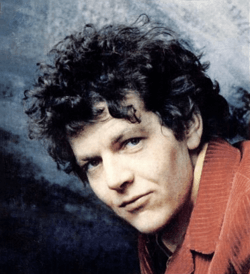David Blue (musician)
| David Blue | |
|---|---|
|
David Blue in 1966 | |
| Background information | |
| Birth name | Stuart David Cohen |
| Born |
February 18, 1941 Providence, Rhode Island |
| Died |
December 2, 1982 (aged 41) New York, New York |
| Genres | Folk |
| Occupation(s) | Singer-songwriter |
| Instruments | Guitar, Vocals |
| Years active | 1965—76 |
| Labels | Elektra, Reprise, Asylum, Wounded Bird |
| Website | David Blue website |

David Blue (February 18, 1941 – December 2, 1982), born Stuart David Cohen, was an American singer-songwriter and actor.[1]
History
David Blue was an integral part of the Greenwich Village folk music scene in New York, which included Bob Dylan, Phil Ochs, Dave Van Ronk, Tom Paxton, and Eric Andersen. Blue is best known for writing the song "Outlaw Man" for the Eagles, which was included on their 1973 Desperado album, as well as released as their second single from this album. Blue's original version of "Outlaw Man" was the lead track of his own Nice Baby and the Angel album, issued on CD, with the entire David Blue catalogue, in 2007 on Wounded Bird Records.
Blue joined Dylan's Rolling Thunder Revue in 1975 and appeared in Renaldo and Clara, the 1978 movie that was filmed during that tour. Blue acted in other films including, The American Friend (1977), directed by Wim Wenders, The Ordeal of Patty Hearst (a 1979 TV movie) and Human Highway (1982) by Neil Young. Human Highway premiered in 1983 after Blue's death. Blue also performed onstage in Stephen Poliakoff's play American Days at Manhattan Theatre Club in New York City, in December 1980, directed by Jacques Levy.
Blue died of a heart attack in December 1982 at the age of 41, while jogging in Washington Square Park in New York City.[2]
Discography
- Singer Songwriter Project (Elektra, 1965) (Blue, who is credited as David Cohen, is one of four artists)
- David Blue (Elektra, 1966)
- These 23 Days in September (Reprise, 1968)
- Me (Reprise, 1970) (released under the name S. David Cohen)
- Stories (Asylum, 1972)
- Nice Baby and the Angel, (Asylum, 1973)
- Com'n Back for More (Asylum, 1975)
- Cupid's Arrow (Asylum, 1976)
References
- Notes
- ↑ Colin Larkin (27 May 2011). The Encyclopedia of Popular Music (5th Concise ed.). Omnibus Press. ISBN 9780857125958.
- ↑ Obituary David Blue, Singer-Actor, 41, Was Part of 60's Folk Revival The New York Times, December 7, 1982
External links
- Further information about David Blue
- David Blue at the Internet Movie Database
- Liner notes to Blue's first album
- David Blue MySpace page
|
